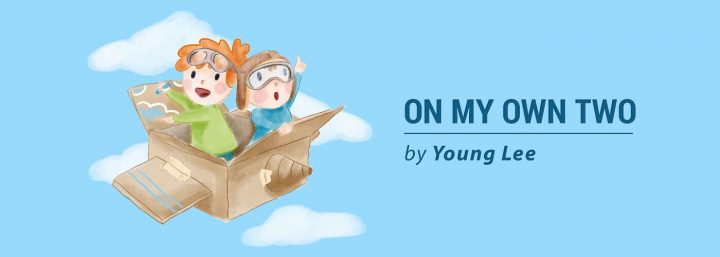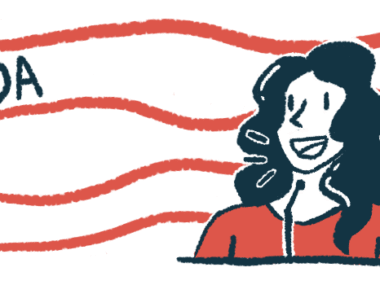We Are More Than Our Mutations
Written by |

Column by Young Lee
Linda Crabtree’s autobiography, “CMT and Me,” begins with loving descriptions of her parents. Her words, accompanied by childhood photos printed on the pages, gave me a vivid sense of what kind of people her parents were. I was eager to lose myself in Crabtree’s imagery of growing up in Ontario in the 1940s.
However, as a fellow with Charcot-Marie-Tooth (CMT), Crabtree’s introduction filled me with nervous anticipation. Although she doesn’t bring it up until a bit later in her book, the question that kept lingering in the back of my mind was, “Which one of her parents was the carrier for CMT?”
I honestly felt ashamed that this question was one of my first thoughts as if I unwittingly reduced someone’s life to a single gene mutation. Isn’t this exactly the opposite of what many of us in the CMT community fight against? However, I think this question and my feelings surrounding it are illustrative of the complicated relationship I have regarding the inherent flaws in my own genetic information but also the family history it represents.
These were a few of my thoughts this past week as I filled a plastic vial with my own saliva to send off to one of those personal genomics testing companies. Although, I don’t think any mass-market genetics kit promises to reveal much regarding health concerns related to inherited neuropathies.
And no results of any genetic testing can answer some of the questions I grapple with.
Questions
How upset should I be that my father passed on his CMT to me? Is CMT so bad that those with the disease should abstain from having children? Just how much of our life experience and the quality of that life is tied to our genes? Is one mutation going to define and shape the rest of my life? Can I love myself and be happy with the genes I have while still calling a flaw a flaw? Is CMT indeed a flaw?
These questions make me feel uncomfortable. And I don’t know how to tackle some of these questions on an intellectual level just yet, but I know what my gut tells me.
CMT story
The small part of my genes that gives me CMT is indeed part of my story, but it’s not the story. And CMT isn’t going to prevent me from living the life I want to live.
I’ve read many stories and heard from folks who’ve decided not to have children because of CMT, and I understand their perspective. However, I haven’t given much thought about my own case, and luckily as I am very much single, I don’t need to address that question personally right now.
Hereditary
I love my family, its history, and its story. I’m proud of it. However, I’m not in love with every single gene and mutation we’ve happened to pass down. And I must be comfortable with that. CMT is just one of many hurdles life throws at us. And we take the good with the bad in life.
I think I like the perspective shared in another autobiographical CMT book titled, “How a Body Should Be?” by Bethany Meloche. In her book she writes about her journey with CMT and she comes to a point when she asks her father whether he felt guilty for passing on his CMT mutation on to her.
Meloche writes that he emphatically rejected this idea that he should feel guilty with a, “HELL no” while citing all the wonderful genes he passed on to her.
Hereditary neuropathy or not, I think everyone can relate to the general feeling that we don’t have the ideal set of genes or, how Meloche eloquently puts it, that how we feel a body should be is so often not how our bodies actually are. Meloche’s conclusions are that “how a body should be is just brave enough to not let the opinions of others stop us from achieving what we want to achieve.”
I really like that sentiment.
For the record, Crabtree reveals about a third of the way through her book, that she inherited CMT from her mother’s side. But from Crabtree’s words, it’s evident that from her mother she also inherited tenacity and perhaps some of her appreciation for art as well. Like all of us with CMT, we are more than our mutations.
***
Note: Charcot-Marie-Tooth News is strictly a news and information website about the disease. It does not provide medical advice, diagnosis, or treatment. This content is not intended to be a substitute for professional medical advice, diagnosis, or treatment. Always seek the advice of your physician or other qualified health provider with any questions you may have regarding a medical condition. Never disregard professional medical advice or delay in seeking it because of something you have read on this website. The opinions expressed in this column are not those of Charcot-Marie-Tooth News or its parent company, Bionews Services, and are intended to spark discussion about issues pertaining to Charcot-Marie-Tooth.






Linda Crabtree
Linda Crabtree here - I didn't know I had CMT until I was 12 and we didn't know that my mother had it until I was in my 40s so that's why where my CMT came from isn't in my autobiography until the middle of the book. I wrote it in chronological order and I was born in 1942. We found out my mother had it in the mid 1980s but until that time thought that I was a de novo case, because mom was so lightly affected. Her biggest problem was high arches. However, I have it 10 times worse than my mother did but she lived to be 96 so at 77, I'm counting on a few more productive years although I can no longer walk and am using to losing the use of my hands. By the way, my book, CMT and Me: an intimate 75-year journey of love, loss land refusal to surrender to a disabling disease is available on Amazon and just about every e-book distributor you can think of. Thanks to Young Lee for mentioning my book on CMT News.
Young Lee
Whoah! Ms. Linda Crabtree! You are awesome! Sorry I don't mean to make it seem like not explaining where your CMT came from was a fault of the book, it was just a question that kept lingering in the back of my mind as I was reading it.
I love your book and I highly recommend it to — everyone really.
I remember when I first started asking questions about CMT to my parents, my mother once mentioned that we used to receive a CMT newsletter when I was very little. A few weeks ago, I asked her if it was the newsletter sent out from your organization, CMT International, and she said it was. So you've had a big big impact on me and my family. We owe you a lot! Thank you for your words, thank you for your book, and thank you for all your work!